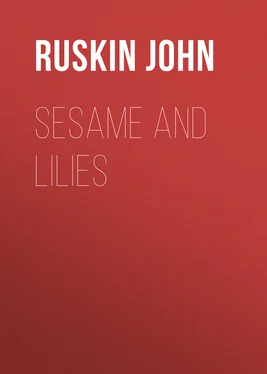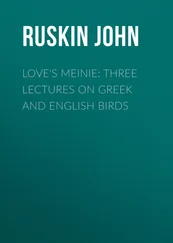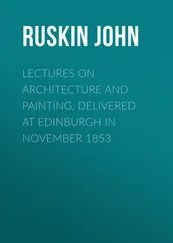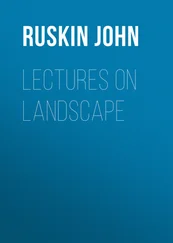John Ruskin - Sesame and Lilies
Здесь есть возможность читать онлайн «John Ruskin - Sesame and Lilies» — ознакомительный отрывок электронной книги совершенно бесплатно, а после прочтения отрывка купить полную версию. В некоторых случаях можно слушать аудио, скачать через торрент в формате fb2 и присутствует краткое содержание. Жанр: foreign_prose, literature_19, foreign_antique, на английском языке. Описание произведения, (предисловие) а так же отзывы посетителей доступны на портале библиотеки ЛибКат.
- Название:Sesame and Lilies
- Автор:
- Жанр:
- Год:неизвестен
- ISBN:нет данных
- Рейтинг книги:3 / 5. Голосов: 1
-
Избранное:Добавить в избранное
- Отзывы:
-
Ваша оценка:
- 60
- 1
- 2
- 3
- 4
- 5
Sesame and Lilies: краткое содержание, описание и аннотация
Предлагаем к чтению аннотацию, описание, краткое содержание или предисловие (зависит от того, что написал сам автор книги «Sesame and Lilies»). Если вы не нашли необходимую информацию о книге — напишите в комментариях, мы постараемся отыскать её.
Sesame and Lilies — читать онлайн ознакомительный отрывок
Ниже представлен текст книги, разбитый по страницам. Система сохранения места последней прочитанной страницы, позволяет с удобством читать онлайн бесплатно книгу «Sesame and Lilies», без необходимости каждый раз заново искать на чём Вы остановились. Поставьте закладку, и сможете в любой момент перейти на страницу, на которой закончили чтение.
Интервал:
Закладка:
My friends, I do not know why any of us should talk about reading. We want some sharper discipline than that of reading; but, at all events, be assured, we cannot read. No reading is possible for a people with its mind in this state. No sentence of any great writer is intelligible to them. It is simply and sternly impossible for the English public, at this moment, to understand any thoughtful writing,—so incapable of thought has it become in its insanity of avarice. Happily, our disease is, as yet, little worse than this incapacity of thought; it is not corruption of the inner nature; we ring true still, when anything strikes home to us; and though the idea that everything should "pay" has infected our every purpose so deeply, that even when we would play the good Samaritan, we never take out our two pence and give them to the host, without saying, "When I come again, thou shalt give me fourpence," there is a capacity of noble passion left in our hearts' core. We show it in our work—in our war,—even in those unjust domestic affections which make us furious at a small private wrong, while we are polite to a boundless public one: we are still industrious to the last hour of the day, though we add the gambler's fury to the labourer's patience; we are still brave to the death, though incapable of discerning true cause for battle; and are still true in affection to our own flesh, to the death, as the sea-monsters are, and the rock- eagles. And there is hope for a nation while this can be still said of it. As long as it holds its life in its hand, ready to give it for its honour (though a foolish honour), for its love (though a selfish love), and for its business (though a base business), there is hope for it. But hope only; for this instinctive, reckless virtue cannot last. No nation can last, which has made a mob of itself, however generous at heart. It must discipline its passions, and direct them, or they will discipline it, one day, with scorpion whips. Above all, a nation cannot last as a money-making mob: it cannot with impunity,—it cannot with existence,—go on despising literature, despising science, despising art, despising nature, despising compassion, and concentrating its soul on Pence. Do you think these are harsh or wild words? Have patience with me but a little longer. I will prove their truth to you, clause by clause.
(I.) I say first we have despised literature. What do we, as a nation, care about books? How much do you think we spend altogether on our libraries, public or private, as compared with what we spend on our horses? If a man spends lavishly on his library, you call him mad—a bibliomaniac. But you never call any one a horsemaniac, though men ruin themselves every day by their horses, and you do not hear of people ruining themselves by their books. Or, to go lower still, how much do you think the contents of the book-shelves of the United Kingdom, public and private, would fetch, as compared with the contents of its wine-cellars? What position would its expenditure on literature take, as compared with its expenditure on luxurious eating? We talk of food for the mind, as of food for the body: now a good book contains such food inexhaustibly; it is a provision for life, and for the best part of us; yet how long most people would look at the best book before they would give the price of a large turbot for it? Though there have been men who have pinched their stomachs and bared their backs to buy a book, whose libraries were cheaper to them, I think, in the end, than most men's dinners are. We are few of us put to such trial, and more the pity; for, indeed, a precious thing is all the more precious to us if it has been won by work or economy; and if public libraries were half so costly as public dinners, or books cost the tenth part of what bracelets do, even foolish men and women might sometimes suspect there was good in reading, as well as in munching and sparkling: whereas the very cheapness of literature is making even wise people forget that if a book is worth reading, it is worth buying. No book is worth anything which is not worth MUCH; nor is it serviceable, until it has been read, and re-read, and loved, and loved again; and marked, so that you can refer to the passages you want in it, as a soldier can seize the weapon he needs in an armoury, or a housewife bring the spice she needs from her store. Bread of flour is good; but there is bread, sweet as honey, if we would eat it, in a good book; and the family must be poor indeed, which, once in their lives, cannot, for, such multipliable barley-loaves, pay their baker's bill. We call ourselves a rich nation, and we are filthy and foolish enough to thumb each other's books out of circulating libraries!
(II.) I say we have despised science. "What!" you exclaim, "are we not foremost in all discovery, 9and is not the whole world giddy by reason, or unreason, of our inventions?" Yes; but do you suppose that is national work? That work is all done IN SPITE OF the nation; by private people's zeal and money. We are glad enough, indeed, to make our profit of science; we snap up anything in the way of a scientific bone that has meat on it, eagerly enough; but if the scientific man comes for a bone or a crust to US, that is another story. What have we publicly done for science? We are obliged to know what o'clock it is, for the safety of our ships, and therefore we pay for an observatory; and we allow ourselves, in the person of our Parliament, to be annually tormented into doing something, in a slovenly way, for the British Museum; sullenly apprehending that to be a place for keeping stuffed birds in, to amuse our children. If anybody will pay for their own telescope, and resolve another nebula, we cackle over the discernment as if it were our own; if one in ten thousand of our hunting squires suddenly perceives that the earth was indeed made to be something else than a portion for foxes, and burrows in it himself, and tells us where the gold is, and where the coals, we understand that there is some use in that; and very properly knight him: but is the accident of his having found out how to employ himself usefully any credit to US? (The negation of such discovery among his brother squires may perhaps be some discredit to us, if we would consider of it.) But if you doubt these generalities, here is one fact for us all to meditate upon, illustrative of our love of science. Two years ago there was a collection of the fossils of Solenhofen to be sold in Bavaria; the best in existence, containing many specimens unique for perfectness, and one unique as an example of a species (a whole kingdom of unknown living creatures being announced by that fossil). This collection, of which the mere market worth, among private buyers, would probably have been some thousand or twelve hundred pounds, was offered to the English nation for seven hundred: but we would not give seven hundred, and the whole series would have been in the Munich Museum at this moment, if Professor Owen 10had not, with loss of his own time, and patient tormenting of the British public in person of its representatives, got leave to give four hundred pounds at once, and himself become answerable for the other three! which the said public will doubtless pay him eventually, but sulkily, and caring nothing about the matter all the while; only always ready to cackle if any credit comes of it. Consider, I beg of you, arithmetically, what this fact means. Your annual expenditure for public purposes, (a third of it for military apparatus,) is at least 50 millions. Now 700L. is to 50,000,000L. roughly, as seven pence to two thousand pounds. Suppose, then, a gentleman of unknown income, but whose wealth was to be conjectured from the fact that he spent two thousand a year on his park-walls and footmen only, professes himself fond of science; and that one of his servants comes eagerly to tell him that an unique collection of fossils, giving clue to a new era of creation, is to be had for the sum of seven pence sterling; and that the gentleman who is fond of science, and spends two thousand a year on his park, answers, after keeping his servant waiting several months, "Well! I'll give you fourpence for them, if you will be answerable for the extra threepence yourself, till next year!"
Читать дальшеИнтервал:
Закладка:
Похожие книги на «Sesame and Lilies»
Представляем Вашему вниманию похожие книги на «Sesame and Lilies» списком для выбора. Мы отобрали схожую по названию и смыслу литературу в надежде предоставить читателям больше вариантов отыскать новые, интересные, ещё непрочитанные произведения.
Обсуждение, отзывы о книге «Sesame and Lilies» и просто собственные мнения читателей. Оставьте ваши комментарии, напишите, что Вы думаете о произведении, его смысле или главных героях. Укажите что конкретно понравилось, а что нет, и почему Вы так считаете.












